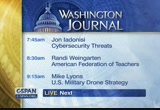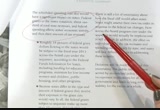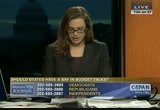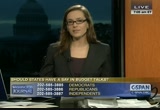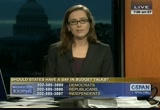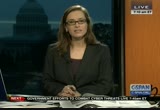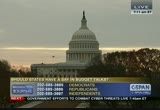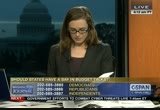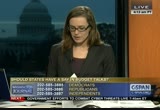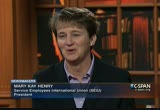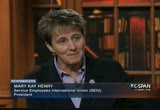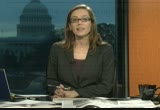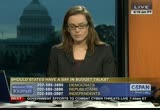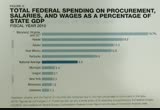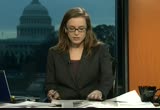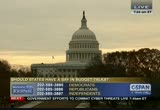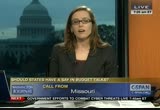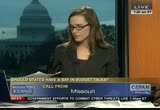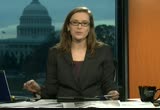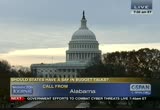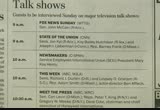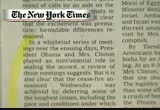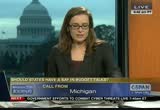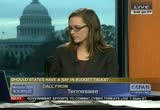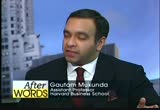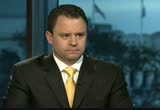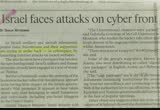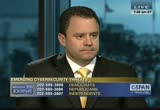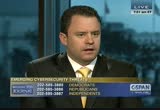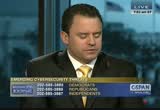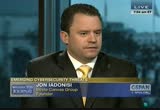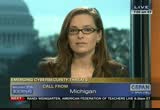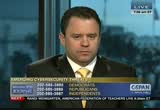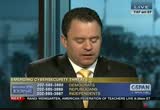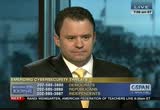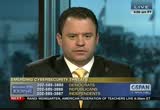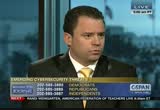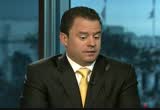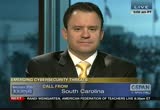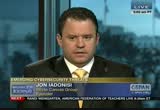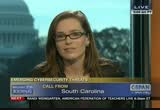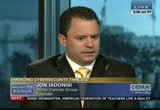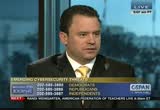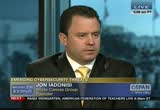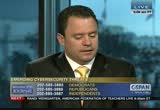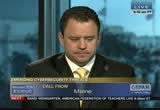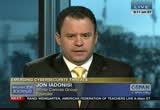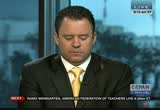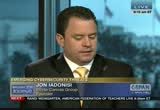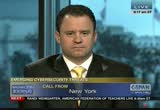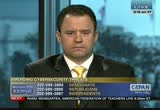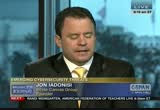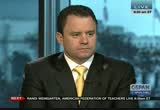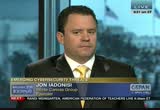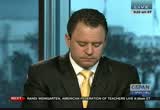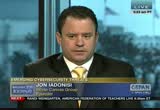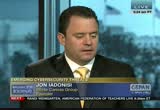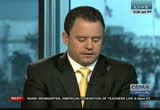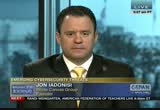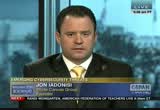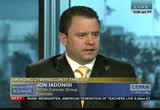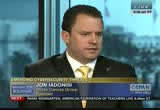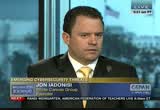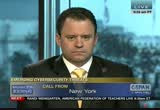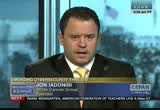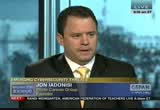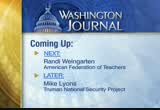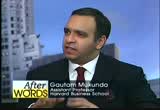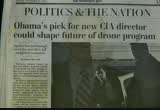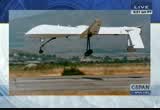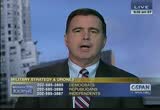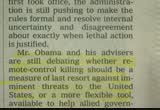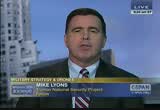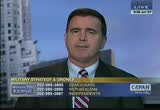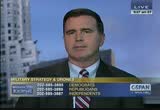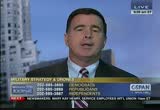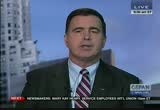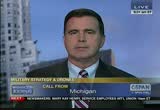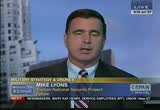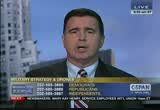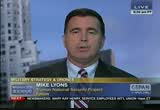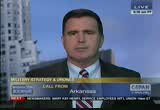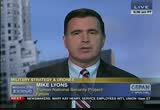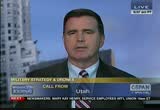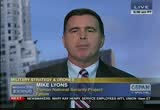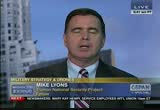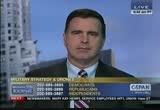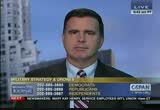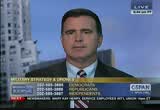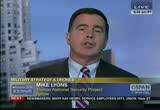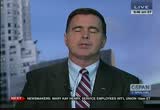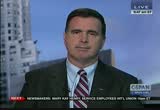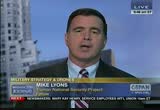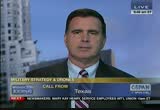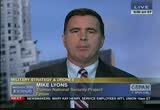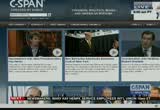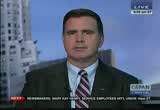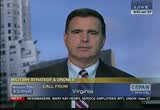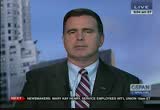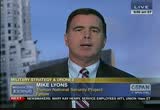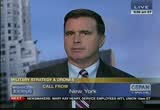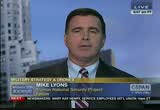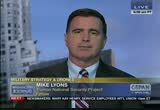tv Washington Journal CSPAN November 25, 2012 7:00am-10:00am EST
7:00 am
a possible review of the military drone strategy. "washington journal" is next. host: good morning. welcome to "washington journal." congress returns to washington with the clock counting down on time left to tackle the tough fiscal cliff and make decisions about taxes, spending, and budget cuts. states are looking at how they can be affected. a question for you this morning, whether states should have a say in budget talks. here are the numbers to call.
7:02 am
7:03 am
7:05 am
some of the benefits states could receive, nobody is retained that president obama and republicans in congress will fail to reach an accord because they feel -- they fear that the resulting combination of spending cuts and tax increases could prompt another recession, which their states can ill afford. let's go to houston, texas and hear from barry. caller: high. host: am i:should sit seven role in the negotiations? we are hearing about how republicans and president obama are negotiating. caller: i think the democrats should have some form of a
7:06 am
democratic rip -- rip at the table. i believe everybody should be involved. it has gone on too far like this without points being made. our domestic investment needs to be saved. they need to cut the military spending down and preserve the safety nets. raise the taxes up and let's be done with it. i do not understand what the problem is. host: here is a comment coming from facebook. you can join the conversation on facebook by looking for c-span and weighing in there. let's go to the next call, jason from new jersey on the independent line.
7:07 am
caller: good morning. thank you for c-span. i think it is is important to talk about states' rights, which are written in the constitution and our viable under the fact all states have their choice to put their own business first. it is a crucial part of the democracy. the federal government can get involved when they are needed to, but for the most part our country functions with state rights. i think we need to get back to that. especially with issues of budgets. thank you for c-span. host: thank you for that call. you can call us and give your input. i will give you the numbers again. they are different this morning. looking more at what some of the
7:08 am
7:09 am
jodi joins us from missouri. an independent caller. caller: the people who are in this state should have a say so for the government, also. host: we miss the first part of your call. how should it be done? caller: i think the state should poll the people and the people should have an influence on the state. the people who run the state
7:10 am
that keep the state's going. i think like the electorial vote, i do not think that should be it. i think it should be the people. i think the people should tell -- they should be the influence on the state within the fiscal cliff. i think they should, you know, be the say so of the state. host: let's go to are a from atlanta, georgia on the democrat line. caller: i think we need to but congress had all this business. i think it is very important that they do. that is what they are elected for. i just do not think the states would benefit from having grand elections, more spending, more commercials and when the money needs to go directly to the people. we also need to be wary of cutting spending on the
7:11 am
platform, cuts in programs of obama's platform. host: do you think the states should use their line of communication of congress or the white house? caller: i think we need to trust the congress and believe that we have elected them to do the state's business and trust them to do it. host: let's go to mike. caller: i think the states already have several budgets to their elected officials. if the governor wants to have a say on the budget, get a hold of their elected officials, their congressman, bring them to the governor's office and laid the lot down to them on what the what the congressman to go back and portray in washington. host: let's hear what marie has
7:12 am
to say on the independent line. caller: i think only the blue states should have a say because the blue states contribute overwhelmingly more money to the federal government. the red states tend to be more petty minded and selfish, anyway. the blue states give them money. let them do with their little money they get. i will lead the blue states -- all of the blue states need to participate. host: how did you decide that? did you base that on who their governor is are there legislature? caller: look at the map. i see where the red states are and the blue states are. the blue states are where your better educated higher income people live who i think are a
7:13 am
little more egalitarian. i see the old south, and as i call it, the new south which are the state's mostly midwestern up to the north central canadian border. the state's that have large states with small populations that tend to be spoiled and selfish minded. they get a lot of money from the federal government, and they do not appreciate what they get. host: we will take a look at what stage get from the federal government in just a little while. first, "newsmakers," which will be on at 10:00 this morning, has a conversation with mary kay henry, who was a labor leader who went to the white house to meet with president obama to talk about what is to come in the weeks ahead and the months ahead. let's take a look at one excerpt from the interview. this is talking about these
7:14 am
questions of the fiscal cliff. [video clip] >> what about speaker john boehner's concept of a bridge deal, which could be a revenue package and tax reform and the new year that does bring in new revenue? >> i think it is a wonderful idea to have tax reform in the new year. i think john boehner keeps trying to soft and what the american people said on november 6. that is why i am so adamant against rejecting it. we need to use this moment to answer the call of the american people, which they said loud and clear on november 6. >> what do they plan to do to help the president? how much money do you plan to spend? >> we have joined with other organizations, labor and community, which started on november 8 with 44 actions a run the country.
7:15 am
we were doing visits on the hill together. we just went up on the air with paid media to do education a run the the id -- with key states and we are bringing local leaders together to lobby congress the week after thanksgiving. then we will do another day of action on december 10. we have additional actions planned in the week of the 10th and the 17th. we will make a decision about what to do and where to do it based on what we hear from congress the following week of thanksgiving. we are putting a lot of paid resource. we have kept our members off the job to continue to do education of their family, friends, and co-workers and in key districts so it is a second campaign. the president said that to us. there was a campaign to get
7:16 am
reelected, and there must be a campaign to get the first key part of the agenda. host: you can see that at 10:00 this morning. at a certain ratio read jogged -- that excerpt showed her talking about the fiscal cliff and john boehner. we are asking you if states should have a say while they negotiated the fiscal clef. about tax cuts, spending, and the budget. let's hear from leah in garland, texas. caller: thank you for c-span. i do not think the states should have a right because it is complicated enough to deal with congress. i certainly hope we will pay attention. another thing, too, is that all of the seven states that have
7:17 am
not set up their exchange for health care, i think obama should put them all on medicare. that way the people will not suffer. that is my opinion. let congress handle it. obamacare should not be on the table. i have no problem with us going over the fiscal clef. host: david from union city. good morning. are you with us? ok. dave is turning into the tv rather than the phone call. we will look at the peace study. -- pew study.
7:18 am
7:19 am
let's go to springfield, georgia on the independent line. caller: good morning. my comment is there are a number of states that are not paying enough to the federal government. they get a lot more money back. to have these states have more input into the crisis, i think it would be a major mistake. the election has been decided already. obama 1. his referendum should be, it just that, what ever he wants. the states are complaining. they're not paying enough to the federal government. you have a lot of other states that are more liberal that are supporting people. host: agusta, georgia.
7:20 am
caller: actually, the people have spoken. they have spoken because they reelected president obama. the bottom line is this. if only the republicans can get over losing, that we do not have to have this problem. we can pass this. we will not have to suffer for the fiscal cliff if only they realized that president obama has won, he cannot run again. why do they not just sit down together and let this happen? that is the bottom line. they are sore losers. that is the bottom line. i t was so very much. host: one of our callers has called in and talked about states and how it would be specifically affected.
7:21 am
this study from pew points out -- here are states that would be effective because of total federal spending next to them on procurements salaries and wages as a percentage of their state gdp. they include maryland, virginia, d.c. hawaii, alaska, new mexico, and kentucky. did you see those that would be less effected which are michigan, oregon, minnesota, and delaware. it could reduce the state personal income and the sales tax revenues and increased demand for state-funded income support programs. the effects on states would vary depending on how much they benefit from that money. total federal spending on procurement salaries and wages
7:22 am
7:23 am
maryland. caller: hello, how are you doing? i just wanted to make a statement. you cannot satisfy these people. people are not going to ever be satisfied. they are of the situation of who obama is and what he is representing and so forth. you are going to have republicans, you're going to have democrats and independents -- everybody is against this man. host: what do you think about the role states should play? should they have a say as congress and the white house talk about the fiscal cliff? caller: the whole thing about the matter is, the states have their own problems. they need to handle their own problems. do you know what i am saying?
7:24 am
they need to let the president -- he is the president of the united states of america. he needs to get over saying he is not this and he is not that. host: it is also the congress that has an influence a role in this. should the states trust congress to strike the deal with the president? caller: they need to get their butts out of their tails -- host: let's move onto michael on twitter. rick joins us from pittsburgh, a missouri and the democrats' line. caller: hello. it is vick. good morning. it has been awhile since i talked to c-span. my concern is this.
7:25 am
i voted for obama two times. i am a white man, 58 years old. i have been -- this is the bottom line. there is racism still underlying current. they need to get over the problem and accept the fact that the white man has lost and it is now a totally multiracial nation. host: what does that have to do with the fiscal cliff and state's roles? caller: a lot of the people being affected, especially in the -- happen to be multiracial and white. the few at the top -- and i know them at the top -- the wealthy man has plenty to have
7:26 am
it. he has plenty to share. he has plenty to give it. he can spend that much money to buy a congressman or whatever. he could be able to fork over some dollars. i am also talking about corporations. it should be able to fork over dollars to pay for defense. they use defense. they are the ones that privatize defense and make the most money, cut the most deals with the state department. i believe that they need to bring our boys back. they need to get rid of privatization -- privatization in the military. make all the federal government employees, not 70% of the
7:27 am
intelligence being run before obama was even a president, 70% was run by privatized -- privatization. host: we will leave it there and go to a tweet. bill shared his comments by writing @cspanwj in his tweet. here are some facebook comments coming in. our next caller is karen from newport news, virginia at the republican line. caller: good morning to you.
7:28 am
the state's need to have an opinion because they are going to cripple in the areas that depend heavily on the government. those people a denture those areas that are populated generate a lot of money. they're not just going to cripple the military or the government. they're going to cripple the people working around the revenue depending on the income they bring in. states have to have a here. say -- a here say. host: a could be affected because of the defense spending and employs that live a center of the virginia area. does this affect you personally? caller: it affects everybody personally.
7:29 am
they need to get educated on how much income when navy ship actually brings into a community. just one chip. host: thank you. let's go to brian in illinois on the democrats' line. caller: good morning. there are two things i want to say. being in illinois, there is no way i want my state having any input on the federal budget or the fiscal cliff. illinois is ranked 51, and this has been a democratic state for 34 years. we are broke over here. i also disagree with the union president leader comments. president obama got less of votes this time than four years ago. he won the electorial college in
7:30 am
a landslide, but the actual vote count was less than 1 million. i do not think they can come out with a hammer and hammer through anything people want. i think this is going to take a definite compromise on both sides. we cannot cut drastically. there will have to be cut. it will have to be tax increases. the tax increases are going to be across the board. thank you. host: do you think congress and the white house will be able to come to some terms before we hit the end of the year? caller: on one side, there has been a strategy from the white house to vilify congress. it includes not just the republicans. there has been no budget proposed for three years.
7:31 am
let the president come up with an idea and get his people in congress to sway the other side. i have not heard an idea yet. what they really wanted to do was promote this -- we have to tax the rich more. i believe that. you cannot tax enough of one part of the population. everybody is going to have to put more money on the table. that is just a fact. host: this is what jan tweets in. our next caller joins us from tuscaloosa, alabama on the democrats' line. caller: i hope they do not give the states any input, especially talking about some of the southern states. anything that the government proposed that would give african-americans a level playing field, jeff sessions
7:32 am
will vote against it. they have elected some of the most hated people in the congress and the senate for alabama. they do not want the african- american -- they do not care what happens, they do not what the african-american to have a fair break. whatever evidence -- whatever the state has left over, that would be for the progressive white people. there are progressive people in alabama, but they cannot get elected. seven congressional districts, she has to act for the african- americans all over the state of alabama. host: we are talking about whether you think the states should have a seat at the table. the cuts will take place unless they act. do you think states should have a role? let's go on to jim.
7:33 am
caller: good morning. i would take the position that the states are essential to participate in this discussion as much as they are affected by what happens at the federal level. i think we can see that the federal level, they are incapable of doing it. the state's need to be sitting at the table and the forceful. they need to set an example for washington to get this done. three years, i mean, three years ago, the budget -- that is a joke. states are used to doing this and working this out. they have the track record to show it. obama needs some help to get it done. his people in congress are as
7:34 am
incapable as he is. host: another comment coming to us from twitter. we are taking a look at the sunday talk shows happening this morning. we can look at a line up of the guests on fox news sunday. senator john mccain from arizona. state of the union features senator kyl from arizona, kay bailey hutchinson from texas, and joseph lieberman of connecticut. also, congressman barney frank from massachusetts. as we mentioned on newsmakers, mary kay henry. on abc this week, richard durbin of illinois, lindsey gramm of the south carolina. we will see adam smith from washington and a ban affleck who directed "argo."
7:35 am
on me to the press, carl levin, peter king, and gregory meeks. we will also see the chairman and chief executive of honeywell international. our next call joining us on the independent line. we have pat from tennessee. caller: you made the statement a few minutes ago, exactly my thought. when you have senators and representatives of their in congress, then they are representing the states. that is how the states have a say in the budget talks. i noticed a while back they talked about reducing your marks. that is when they put things in that they want to add to the
7:36 am
budget, things that the one for the states. that is how they are represented already. thank you. host: thank you. what you were quoting was eight tweet that came in that said states already have a say by sending members to the house and senate. democrats line. caller: i think today pose the question is interesting. this was one of the first questions addressed by congress back in the summer of 1787 at the constitutional convention. the convention had only originally begun to address some issues of a need to strengthen the articles of the convention. in those days the contest between virginia and maryland about who had control over the potomac river. what happened was during the convention, and start -- it certification -- it sort of
7:37 am
turned into a new constitution. the debate was whether the large states -- it was about states' rights. the large states were concerned that individuals would be cheated out of their right to vote. in the days of the articles of convention, it's of the states after the war just had one vote each. what you have is a large stake concerned about the rights of the individuals to be represented and the small states not wanting to be dominated. the guy who finally came up with the answer was a guy name roger sherman. he decided, let's have a two house is in the congress. a house of representatives and the senate. the senate will be determined -- voted by the various state legislatures and the
7:38 am
7:39 am
7:41 am
condoleezza rice giving a word of warning about what could happen at the entrance area. she says war is building to a question though. elections are over, not america must act. also on the op-ed page of "the washington post." rahm emanuel who works for the president and is now mayor of chicago says -- what the you think about the role that states or local governments should have in negotiating the fiscal cliff and the issues before washington?
7:42 am
a republican caller from michigan. caller: yes. thank you for taking my call. all i wanted to say was, we are already represented in the congress and the senate for the fiscal cliff. host: you think that is enough? caller: i think that is enough. all we have to do is call our senators and congressmen and give our opinion there. host: here is the headline in the "the new york times." we have a tweet that echoes with the last caller says. charlotte on the democrats' line. caller: hello.
7:43 am
how are you doing? i agree with the last caller that clarified it constitutionally, no, the states should not have any say in the federal budget. i agree with the young man from alabama. that would be in the south oppressed people. our representatives have a different agenda than the federal and the north and east and west. it is oppression and oppression of women and people of color. it is awful. no, you saw with the states did with voter oppression individually. we cannot afford that. host: one thing we have been looking at is a report from the pew center on the impact of the fiscal cliff. you can find us online on the web site. if you would like to see how your stay might be impacted by
7:44 am
the fiscal clifford. coming up, we will look at cyber security with jon iadonisi on the council of foreign relations. later on, the priorities of labor unions as negotiations began at to avert the fiscal cliff. we will be right back. [captions copyright national cable satellite corp. 2012] [captioning performed by national captioning institute] >> general, what about if the soviet union announces tamara -- which i think he will -- if we attack key but it will be nuclear war. >> we are going to be an easy. we have to do something.
7:45 am
something may make them should them off, i just cannot believe this will. i will say this, i want to keep my own people very alert. >> hang on tight. >> it is a fascinating moment. it is amazing that eisenhower tells him to have his people elect. they are completely on the edge, so of course they are alert to. then he kind of says, hang on tight. that is a nice moment, even on the terribly tense day they are able to joke a little bit with each other. especially during the crisis. i think they had a sense of how lonely it can be at the office and you are getting all kinds of advice. are getting good advice and faulty advice. eisenhower knew all about faulty military advice. he was able to speak with his supreme authority about the dangers as well as the advantages of military advice.
7:46 am
he was a very useful ally to president kennedy. >> the secret white house recordings of john f. kennedy tonight at 8:00 on c-span's q &a. >> in the democratic national convention, this rhetorical masterpiece that makes him a national figure. four years later, without the speech he is not a possible candidate for the presidency. lincoln gives a speech at the cooper union. it is a beautiful testament to the quality of lincoln's mind. it is a fantastic speech. when he ran for the senate -- when barack obama gave a speech in 2004 he was running for the senate and he won. abraham lincoln ran for the senate to in illinois and he lost. if you want to think about abraham lincoln in 1960, -- 1860, think about barack obama running for senate if he had
7:47 am
lost the election and not when it appear that is what we are talking about here. >> gautam mukunda profiles historical leaders for those who had the greatest impact in their time. he talks to rihcard brookheiser tonight at 9:00 and midnight eastern. "washington journal"continues. host: jon iadonisi is a former navy seal. he focuses on cyber security. how real the cyber security thread is. guest: that question has been asked quite a bit over and over again. it is surreal that it is probably happening as we speak. cyber threats and cyber attacks -- i do not know if he saw last week in the paper during the
7:48 am
israel palestinian conflict, there was an attack, several hundred million what is called the denial of service attack. i think that is an example of something that reflects how prolific these are. host: let's look at a story from -- guest: that is significant and enter a couple of ways. the sheer magnitude of it is something that redefines paradigm when it comes to conflict and how we fight each other. in 2007 in estonia during a two
7:49 am
week. , i do not know if you'll remember a massive cyber attack that resulted in not just infrastructure being taken down such as military or something uniquely defense, but even more severely, atms, gas pumping equipment, things that really impacted everyday people. i think when you saw that, even though it was five years ago and you see it now on a greater magnitude, it really illustrates the increasing importance that is needed on this issue. host: president obama took to the pages of "the wall street journal" on the threat he sees from cyber attacks. here is a story from a few days ago. what is the government impose a concerned about cyber? guest: there is not a singular concern. i think everybody is concerned about what happens with 9/11 happening in a digital space. there is no real way to forecast
7:50 am
how severe the damage or how widespread the damage. i would say the number one concern is, we need to ensure that our infrastructure and our critical resources are shored up against the potential for a digital 9/11. host: if you would like to talk to jon iadonisi about cyber security and cyber threats, here are the numbers to call. cyber attacks come from a variety of groups and people. give us a breakdown of who actually commits cyber crimes. guest: i think the question is one that i get all the time. who are the usual suspects? the way i break it down is, you have criminals, people on line to perform some kind of criminal
7:51 am
activity, whether it is money laundering, breaking into bank accounts and stealing money, or selling credit cards. that is one area i would say is its own unique stovepipe. second, i would say you have haktivists like anonymous and these groups that are not just a single person but they are more like an on-line movement. their goal is to make a statement and to impact a political and state. and did you go into state- sponsored and governments where it is actual a lack of a better term a uniform wearing government person or group during the attack. did you have the lone wolf people who may be operating independently from an amateur level trying to see what they can get away with it. host: what we mentioned a moment ago about cyber attacks against
7:52 am
israel said anonymous took credit. remind us who that is. let me read this first. do we know if this was politically motivated or if it was ethnically motivated in terms of internet and free access? guest: i do not think they have a particular target, if you will, for their attacks on governments. i do know that many of their actions are founded in what their understanding is of human rights violations of improper government infringement of the freedoms, other social issues and greater social issues. anonymous is not one person. it is a movement.
7:53 am
the decentralized structure of their movement is difficult to attend the and understand precisely what their intent is. it is largely leaderless. host: what is the government's approach to cyber security? you laid out three main groups that can be a threat. how does the government deal with it? guest: today i just read the cyber bill has stalled and is actually dead now. i think that was a " somewhere in "the washington post." the government has tried several different bills in the past year and a half. one was the bill that went to sopa and then with the cyber security act. i think the government approaches-- approach is something that continues to be debated. on one side you have the
7:54 am
republicans saying that the chamber of commerce rejected the bill because there is a definite business impact to control and government regulation. on the other side, on the democrats' side you have a notion of, we need cyber security. this is the way to do it. there is definitely the right answer. i think history would remind us there are several things to reflect on on how we achieve this in the past as a society. in the early 1700's piracy was a big phenomenon. that was largely undefinable. you cannot put a geographic boundary around a body of water i can a land space. the concept of cyber makes it more complex to try to pass policy that shapes it. the answer to piracy, you had the treaty of western australia which, the many nations came
7:55 am
together and agreed on what piracy was. it was internationally recognized as a crime and people would be prosecuted. i think this is certainly not a singular u.s. action. i think it needs to be across international boundaries, much like the medium by which the debating is. host: let's get to the phones and say what michigan has to say. caller: can you hear me? host: we can. caller: does this violate -- this violence constitutional law. host: does fighting cyber crime violate the law? caller: the bill that is actually being passed to create cyber police or cyber security -- this deal that created
7:56 am
violates the constitutional laws. host: we have a couple of bills on the table, but we also seeing the white house. we mentioned that the president has asked for the military to act more aggressively. guest: obviously, i do not have all of the details on this particular bill because it is classified. however, i can tell you, have spent nine years until the military. i have been a part of a lot of operations. in every case, the legal opinion was always an issue that was never passed over to ensure that not just u.s. citizens' rights were in storage but also the rights of the international. i cannot comment on the bill. i have not seen it. i can tell the historically i have never come across a situation where the law was something that was ignored. host: the reason you have not
7:57 am
seen it is because it is a secret directive that this point. "the washington post" goes on to say -- give us a sense of how the government can actually block cyber threats. what are the nuts and bolts of this? guest: that is a good question. a lot of the answers are classified. but i think one of the things to look at is the human infrastructure behind a lot of threats. a lot of people disregard that. in most cyber attacks there is a person behind the computer that decides to open an e-mail, decides to answer a phone and give somebody a password. the digital social engineering is one of the most effective ways -- when you can as the
7:58 am
industry itself, you will see a lot of people are not really focusing on that. that is one thing i see that the government needs to move more towards. it is education of the people that operate the systems that to make them more aware of the complexity of the social engineering attacks. host: let's hear from robert. good morning. caller: good morning. i just wanted to say that cyber security is actually good. and activity of congress regarding the fiscal cliff, i think it is good to have laws debated as strict as the ones on cyber security. that is my comment. guest: i appreciate your comments. i think the fiscal cliff and the
7:59 am
interaction of that and the impact of that with cyber is something that needs to be considered. that is one that kind of spearheads the reasons why not to pass the bill. the increase in government's size. there are a lot of other challenges as far as finding the right technical expertise within government entities to be able to secure cyber. it is a challenge. i think in the time of when government spending is under a lot of scrutiny, it makes it difficult. host: here is a question on twitter. guest: we get the question a lot. the company was founded by myself and my business partner who is a world class himself, about eight and a half years ago. the goal of the company was to challenge conventional paradigms' through our products
8:00 am
and solutions. we use things like mobil, the internet in new and meaningful ways to really change the way people view the world. we kind of view the world as going through a digital renaissance right now. we look at the past couple hundred of years, you had michelangelo and then you fast forward several centuries and you have steve jobs and bill gates, who built the computer. with computing technology and science and art, the sky is the limit. with chemistry, you start with the white canvas and bland art and design with practical use. host: you have a project that was used in the sandy effort. how does that relate?
8:01 am
guest: just as facebook brought to light the concept of social networking, everyone of us has a mobile phone. it enables organizations and companies to leverage the crowd of people i am calling everyone -- by empower when everyone -- by empowering everyone with a mobile phone. in real time, his pictures can send the exact location back to a server with a map on it. the picture and the math -- the picture is over late in real time. it enabled decision makers to make meaningful decisions in real time.
8:02 am
host: jon iadonisi is the founder of the white canvas group. is a former naval seal. caller: i would like to ask your guests to comment on the recent theft of three-4 million tax record by international hackers. the blame has been placed on the federal government. where does the true blame like -- to blame for something like this fall? is it with the federal government? the state of south carolina could use some help in protecting the citizens from this kind of cyber crime. guest: thank you for that question. it is an interesting question. it defines the nature of the cyber problem.
8:03 am
most of these attacks and the one in particular you are speaking of cross federal, state, and national boundaries. i do not know the details of the particular task of that attack you are mentioning, but it probably involve some kind of social engineering attempt. -- i do not know the details of the particular attack you are mentioning, but it probably involved some kind of social engineering. it could have caused a server in france to attack the servers in south carolina. that really illustrates the complex nature and multilayered dimension of the threats. holding a particular person responsible is a difficult thing to do. what needs to happen is a standard means to be defined federally and internationally setting the line in the sand as
8:04 am
far as what is an attack, who is responsible for the attack and how policy and accountability are maintained in that environment while insuring people's privacy rights. host: let's hear from dave on our independent line. caller: i just ask you the question. host: sorry. i need some more coffee. hi wes. caller: i think it was a human failure. i think someone granted access either by phone or one way or the other. someone got access to the computer and got their hands on the files. i think we should contract white canvas group as well. the department of revenue, where
8:05 am
the files were stolen, refused to take money for fiber -- for cyber security. everybody is talking, but nobody is going on record. that is what is going on in south carolina. host: how much of your life you put on the internet. are you afraid of cyber attacks? caller: yes. just myself and my family. they have all the information. with just a call, they have your social security number. they can run off with the money or destroy your credit one way or the other. they offered a plan for all south carolinians for monitoring. how good that will do, i do not
8:06 am
know. host: thanks for your call. guest: as the journey continues with the republicans and democrats coming to a consensus on what some of our security is, there is another consideration. let's assume there was a cyber security tsa, that entity would be the single hub pour all things cyber for u.s. main controls. -- for all things cyber for u.s. main control. when i talked about her white campus group, i am talking about -- about white canvas group, i am talking about a new paradigm. host: give us some nuts and bolts. if you are a government and you
8:07 am
are trying to avoid your national security grid or your energy grid getting hacked, how does that work? guest: the average joe is at his house. i meant to the guy who hacked facebook and stole 100 million passwords. i saw the list of the first million. they were literally all the same. people are still using "password 1234." that is 16 right there. that would eliminate 33% of all of the cyber hacking. let's say you run a medium-size business. i think you need to do training on social engineering vulnerabilities and how people need to be protected.
8:08 am
you need hardware and fire walls and things like that. when you get into major corporations, some kind of attack would have tectonic effect. now you need to not just apply the a training -- the training on humans, but you need to ensure public-private partnerships. we need the help of the private sector. the private-sector needs to help the government. this problem is not something that is uniquely government or uniquely private. host: a viewer on twitter says companies give citizens private information to government and
8:09 am
military facilities. is that true? guest: a lot of the dispute of the bill was that it was not focused enough as to what the government was requesting. that is the first part of the tweet. what was the second half what was the second half? host: whether the government can go to bank fire. go too far. guest: people are going to have to reach across the nation and put any sort of partisanship and personal opinion aside and come to a paradigm-shifting policy change. host: dave our next caller,
8:10 am
agusta, -- augusta, maine on the republican line. caller: you guys stole my thunder. the partnership between public and private. the major companies like life lot and major virus software companies -- lifelock and major virus software companies would be a major partnership. there should be more complex passwords. i was just wondering if you had any knowledge as far as this particular bill and legislation being proposed -- was there any consultation with the private sector? guest: thanks for your question. inside the bill, there was a
8:11 am
critical infrastructure advisory partnership and other things. i am not sure you heard the other segment. the two main areas on this are, how can we ensure people's privacy and what is the cost of another regulatory body to private businesses and the government in building another government entity. a simple analogy i use all the time in the studio here or any federal building is, you always see the sprinkler system. that was a government regulation that said, in any public place, there needs to be a minimum level of fire protection. the way to look at it is, maybe the same thing needs to occur in any system that attaches to our the electrical grid, our natural gas grid, our power. maybe it is as simple as their needs to be aimed minimum
8:12 am
thresholds -- there needs to be a minimum threshold of security. there should be mandatory training. i am a small business owner. in new saying that we need to conform to -- maybe there is a way to incentivize small businesses that the government can do and come to an agreement. but something needs to be done. host: less hear from denise, toledo, and in college. hear from denise, toledo, ohio, on the independent line. caller: it just occurred to me that my computer has been attacked. i just tune in and i do not know all that has been said. host: tell us what happened to
8:13 am
you. how did you know your computer had been attacked and what was the fallout? caller: i am a small business owner myself. i started getting these weird e- mails. my address is not one that is easily deciphered. it was like a personal message to me, not to my company. guest: i am sorry to hear that. what i would do if i were you is try to perform some sort of rudimentary -- i hope you have virus software or something to scan your computer. i would inquire with the banks and let them know you had been attacked. is there identity theft involved? can you prove something had been stolen? if i were in your shoes, the
8:14 am
best step you can do is to treat it as if you have lost your wallet and the same step he would use if you have lost your credit cards or your wallet. i would say scarred and get new account information. host: -- safeguard and get new account information. host: tell us what happens to small business what happense -- all business owners like denise as opposed to private citizens. guest: there is another area we specialize in. it is a new solution known as the digital terrain team. everybody has digital terrain. that goes into the realm of reputation. we think reputation is an online phenomena that will continue to
8:15 am
be used in good ways and bad ways. and brands and the way you can control him understanding of brands and reputation. when some of these sites attack, they get the face and that affects the brand. this whole notion of reputation is something that we continue to follow. it came out of the time we spent in the government and watching how bad guys would post videos on youtube and they would title them, u.s. service members raping so and so. it was not that at all. it was a hollywood movie clip that had been sliced. a lot of people do not know that. they assume it is real. that does not help the united states when it comes to security. it does not help our fellow men
8:16 am
and women serving overseas. it does not help their reputation. coming full circle, to answer your question, small businesses need to understand the impact not just at a fiscal level, but at a reputation level and understanding what the digital terrain impacts are. host: jon iadonisi is founder of the jon iadonisi, a high-tech consulting firm. he is a formal navy officer. caller: thanks for taking my call. people have this sense of sublime anonymity when they are on the internet. they give out too much information. the government has to police the internet a lot more. that is so much wrong with the internet. you have to cut out the money supply from the cyber threat people.
8:17 am
if you go on craigs list and you put up and ad, you will get e- mails back and they will send you a check and they will send somebody the next day to pick up the equipment. you have a bad check. this is part of the problem. that is the money supply. these are big organizations that stretch out to nigeria and other foreign countries. they do things through london. this is a huge problem. i could give you tons of examples about that. another cyber threat is the high -- the hackers that take your contact list and they sell the contact list and they will send all of your friends e-mail from you and they think it came from you, but it did not.
8:18 am
they just want you to look at their products. that is a benign, minute hack. the big one is how they get their money. look at payday loan. people give out tons of information. of course there social security numbers are out there. they prey on vulnerable people, people are vulnerable and gullible. the threats of piracy information and how you can avoid a lot of that. i have learned so much over the years about the internet and what people do on the internet. it is really bad. it is blatant. the government does not police it. host: how do we educate the public more. how do we get at the heart of what alex is saying?
8:19 am
guest: we can do a lot. we are doing some studies in graduate school on different ways cyber criminals are operating on line. i do not see craigs lists as criminal activity. but there are ways criminals are using the internet. that presents a lot of challenges. i would like to touch upon the government policing. i think it is important. the government cannot police this. we are talking about the internet in general. on youtube alone, 60 hours of video art of floated every minute. -- uploaded every minute.
8:20 am
there is no physical way to monitor everything. anything about government monitoring gets on can -- gets on thin ice when it comes to security and freedom. host: our guest has a ph.d. in cyber security. he has a master's in homeland security from san diego state university. because our last caller brought up what people can do to take control, what about authentication or other ways consumers can help thwart cyber attacks? guest: i think you are talking about the pgp and sending e- mail.
8:21 am
i was talking to somebody about a deal they made in china. the question was, what should i do. i just drafted out our new business deal and i cannot e- mail it because i am is concerned about the system. they get on a first-class flight and hand deliver it by courier because of the internet. it is unfortunate that that texas. -- that that exists. pgp, pretty good protection, those are free types of encryption software where you exchange keys with somebody. they are able to understand that the e-mail is one originating from you. you are able to read the e-mail and that is sent back in exchange. before you can look at the e- mail, it verifies the this is from libya.
8:22 am
the encryption key must match yours. host: let's hear from allen in new york. caller: thanks for taking my call. i am a navy vet myself. i served in vietnam. in recent years, the government has not seemed constitutionally friendly. like any other technology that comes along, my concern is what would be front line safeguards as far as cutting edge technology that is not used, theoretically, against the american people? guest: first of all, thank you
8:23 am
so much for your service. i think in cyberspace, which is inherently porous, so the best defenses are strong, but under the radar offense. we need to continue to investigate threats aggressively. we need to find out precisely how things are operating and become part of the network to understand it, to understand the magnitude of the threat. to answer your question, we need to insure our offense in areas. we need to further understand the threats in many different dimensions. if all the rise, take action. host: how hard is it -- if authorized, take action?
8:24 am
host: how hard is it to become a hacker? guest: it is easy. if you were becoming a hacker, you were in your mother's basement eating twinkies. that stereotype of originated as these reclusive, super smart people. now, you do not need to be that. you can go online and download a password cracking tool. you can find an anonymous router to spearhead your attack. you can build a botnet. the tools are much more plentiful, which is lowering the barrier for people to get involved. you have people who do not fundamentally understand the technical effects. but they think it is cool to
8:25 am
have this tool. it is much easier than it is -- then it was. depending on what you are trying to -- it is much easier than it was. times are different now and a lot of these tools are widely available. host: how has that changed to dealing with cyber security issues? guest: it changes it because the threat is increased by an order of magnitude. areas you never used to have to worry about like, it is a super strong password and it will take a while to be deciphered. not so much now. you can have a lot of people downloading software to do that. secondly, because we are largely a network society, the internet
8:26 am
connection is almost ubiquitous. we can in this the health of 10 million people to help us crack that password. -- enlist the help of 10 million people to help us crack that password. host: plus 8 darren in illinois in -- let's go to darren illinois on our democrats' line. caller: last year, i've bought christmas toys online. -- i bought christmas toys online. i got these bills from somebody using line christmas card so i reduced my credit term-limit -- credit card limit.
8:27 am
the impact is almost such that i will not order online anymore. what kind of market impact would be if everybody stops doing this for a while because of theft? will the commercial side make an adjustment to come up with some kind of structure to protect people like me and other people? guest: i just got my credit card number stolen a month ago. it happens all the time. i saw some recent reports that show roughly $7 billion to $10 billion of credit card losses. you might be able to trace that theft to being inherently online. just as you can bypass were cracking tools, you can buy credit card swipe machines. just by going to a restaurant,
8:28 am
they can swipe your number and that number is on the black market three days later. the industry alone, the credit card industry needs to continue to work in forcing better protective measures. they also want to make it easier to purchase. they cannot make it so difficult that you are entering a 25 digit password every time you go in to buy something. to answer your question, there is not a single solution to some killed -- to suit your consumers-- to secure -- to secure consumers. host: cyber monday is to model and a lot of people online shop. do you see that as a day -- tomorrow is cyber monday and a lot of people shop online.
8:29 am
guest: when you look at the top three attacks, it is usually cyber crime, hackerism or some other kind of displacement. the cyber warfare piece is small. the question on that is, tomorrow, if i were shopping online, make sure you track your credit card numbers and what you are spending on. most banks are well aware of this and most banks, provided you alert them in time, will understand. i will say that tomorrow, people need to pay close attention. host: one of our call was on twitter rights that -- writes mthat google -- that google has
8:30 am
a two level e-mail. guest: that is a continuing theme. before that happens, he could fill out any sort of e-mail account and there would be no way to tell if you were using that account for nefarious purposes. the phone number provides another level of authenticity. it is definitely a welcome safeguard. host: take that to be larger -- to the larger issue. how do the checks and balances
8:31 am
and repeat entry points work? yesterday -- guest: they are you are switching mechanism on railroad tracks. a lot of these systems are not necessarily like websites. they are connected to the internet for the purpose of monitoring levels. if you think of how they would be secured, he security would have to be on the hardware side when it comes to infrastructure and flexibility. but also, on the human side, sitting inside the control area and getting a phone call saying, this is my goal and we are doing some work on your router. i would like to know what is your ip address. naturally, the person on the
8:32 am
other end of the line was to be helpful. maybe that is the right name of the company. these are the areas that need more education. it is so much data out there that humans will go to the path of least resistance. that is going after you as a person rather than trying to filter out billions of websites. host: twitter says, letting the government have a larger role in security is like having the fox have a larger role in securing the henhouse. let's go to lawrence in new york on the in an airline. caller: good morning. thank you for washington journal. i love this show. i am a cpa. my biggest concern is that there
8:33 am
is so much information on the new york state tax return, which has social security number, dates of birth of the taxpayer, name, address, and where direct deposit of a refund is due. it also includes the banking information. as a practitioner for 30 years, i am is still not comfortable filing electronically. the reason i say that it is i have also had experiences in health care industry whereby, to my understanding, physicians and hospitals, to this day, do not e-mail medical records. i am curious fit your desk has any insight -- your guest has any insight as to whether the internet is safe for medical
8:34 am
records. the taxing authorities have no problem requesting every piece of information other than mother's maiden name. i will wait for your response. guest: great question. i have not engaged with the health-care industry at all regarding that. that is something that needs to be considered. there is a lot of movement toward standardized medical records and the information sharing of medical data. therein lies the issue that you stated innovation to the -- in relation to the tax returns. i put a lot of information out about myself. how does that impact and what if it gets hacked? it is not a fun thing to think about and it is not something that people want to happen. it would cost billions of
8:35 am
dollars should that occur. i do not know what the health- care industry is doing. i can say that on the irs side of the house. i did speak with a couple of irs folks a defcon. we met with some folks and i have spoken with colleagues of mine. i know there are protections. one of the other administrations was hacked in the last few months. the department of navy had a bunch of social security numbers hacked and mine was one of them. if this is going to jump the fence and go into health care medical records, more needs to be done. more educationese to occur and a standard needs to be -- more education needs to occur and a standard means to be created.
8:36 am
host: kevin says scams are not new, just the delivery of them. jon iadonisi, thanks for joining us today. founder of the white canvas group. coming up next, we will talk to randi weingarten on labor unions. negotiations are beginning on averting a so-called fiscal cliff. and then possible policy changes on the military's use of drones. we will be right back. >> what about if the soviet union announced a model that if
8:37 am
we attack killed but there will be nuclear war -- soviet union announced tomorrow that if we attack cuba there would be nuclear war? we have got to use something. >> something may make these people shoot them off. i would say this. i would want to keep my own people alert. >> hang on tight. >> it is amazing that eisenhower tells him to have his people alert. everyone is completely on edge. of course they are alert. kennedy laughs and then he says, hang on tight. it is a nice moment that even on this tense day they are able to joke with each other, especially during this crisis. they had a sense of how lonely his it is to occupy that office.
8:38 am
you are getting all kinds of advice. you are getting a lot of faulty advice, which kennedy was from this joint chiefs. eisenhower knew all about faulty military advice. he was able to speak with his supreme authority about the dangers as well as the advantages of military advice. he was a useful ally to president kennedy. >> ted widmer on "listening in" on the secret white house tapes. "washington journal" continues. host: randi weingarten is president of the american federation of teachers. she joins us from new york. thank you for being here. guest: thank you. we have a lot to be gratified for on this thanksgiving holiday. host: as congress gets ready to
8:39 am
delve into the fiscal cliff and the schedule sequestration, the feel like you are getting a voice in this process? guest: the last couple of weeks right after the election, we have done nothing other than sandy recovering as well as fighting about the balance in terms of the budget. i do not even think the word fiscal cliff is the appropriate word. what happens in december is that the bush tax cuts for the wealthy expire and they should expire. that has been litigated in the election in terms of what mr. romney's position was and what president obama's position was. the president has gotten the greatest voted total for reelection in -- of any
8:40 am
president in history. he was saying we need a balanced approach. we are getting out of a recession. it is still a tenuous recovery. we need to invest in education, infrastructure and we need to find some revenues. that is part of the fight in washington in the next month. host: you believe the tax cuts should expire for the wealthiest americans. what would the impact be on the tax cuts expiring for middle- class americans and others? guest: this election was about how we recreate in a imagine the american dream for those who want to be in the middle class and those who want a broadens middle class. of course, it would hurt. that is part of the reason why they talk about it as sequestration and talk about it as a real deadline.
8:41 am
we need to maintain the middle class tax breaks. we need to maintain a balanced approach. the labor movement is trying to push at that to make sure there is a safety net for medicare, social security, medicaid, making sure there are investments in our future like education and infrastructure and finding some of the revenues to do that. that is why we are pushing for the expiration of the bush tax cuts for the wealthy, for those over $250,000. sequestration -- host: sequestration would mean 8.2% cuts in most programs,
8:42 am
including the department of education. what would it do? guest: early education is a one. to help prepare kids for school. folks are able to do this when they put their kids into pre-k programs. this cut would cut 100,000 slots. that means 100,000 fewer kids would have pre-k programs. this would cut 100,000 health care slots in terms of community medical centers across the country. there are thousands of cuts slated for kids who are in schools that focus on disadvantaged kids. that would mean cuts to music, more cuts to art, more cuts to reading programs that kids need to get ready. if you look at 8.2%, it is a
8:43 am
number. if you think about what it is about, it is about the investment kids really need. we are saying to teachers, we need to help kids think, apply knowledge. we need to raise standards. we cannot be about cutting the things that really help kids. i looked at teachers all across the country. there are 300,000 fewer kids and there were at the start of the recession. that is a 10% decrease. that means kids have less art, less music, less exchequer victory -- less extracurricular activities. kids should have a decent shot of success. host: a caller from pennsylvania on our independent line. good morning, michael.
8:44 am
caller: i have a question for randi. what is your annual salary? guest: my annual salary is about $250,000 a year. i would be happy to pay more in taxes and i think i should. caller: the democrats controlled the white house and the senate and all of these cuts she is talking about, so many less teachers -- i am curious. who does she think is causing that? is she blaming the republicans? it is strange how all of these cuts -- guest: i am not blaming anybody right now. i am giving an example of what
8:45 am
would happen with these cuts. i agree with republicans when they say we cannot waste money. we cannot waste money with a bureaucracy. we are pushing to make sure there is an audit of the money that is spent on testing. at the end of the day, what they recession did was that state after state cut a lot of money out of public education. kids suffered for it. what the federal government has done with education is to backstop. it helps the kids who are most in need. a lot of funding from title one goes to kids in rural and urban areas who are most in need. what i am is saying is that as we get to the december deadline, let's solve this. we cannot cut our way to prosperity. we need some revenues to make sure we have a balanced
8:46 am
approach. host: randi weingarten, a headline recently in the daily chronicle says the obama plan is dominated by loose ends. and an old power struggle between congress and the administration getting in the way. how realistic do you think it is that the obama administration will find education reform in the next four years? guest: we have to we authorize the elementary and secondary school at, which was known during the bush era as no child left behind. that act was about getting resources to the case that needed it most. when johnson created it in the first 10 or 20 years, we saw more equity in public schools
8:47 am
and a greater increase in school achievement and we had in the no child left behind era. we need to have fixed but not close cutest schools so that we stabilize communities and we have schools -- facts but not close community schools -- fix but not close community schools. we need to teach more and test less. when you have places in rochester new york -- rochester, new york where they spent $20,000 for 4000 kids, that is too much testing. we need to teach kids to think critically, work together in groups and apply knowledge.
8:48 am
host: kurt is in wisconsin on our independent line. caller: i have a little bit of a statement. in wisconsin, 89 cents out of every dollar that goes to education goes to teachers' benefits and pensions, which they contribute nothing to. it is not the 8.5% you are worried about for the kids. when i went to school -- i am 73 years old -- parents said their children before they went to school. if they cannot afford food for their children, they got a job. what do you think of that? guest: i believe people should work hard. i know a lot of people who are
8:49 am
trying to find work right now. i taught in the new york city public-school. i taught high school kids. when my kids came in and were hungry in the morning, they were not -- they were suffering. it is great when parents can afford for their case to have breakfast at home. if they do not, we need to do something about that. in terms of pensions and benefits, let me say that teachers in wisconsin get an average of $24,000 in pensions when they retire. that is in exchange for working in a job where you cannot actually save money for your pension. that is what we need for all of america. that is why social security is so important. we need to make sure we have
8:50 am
retirement security. employees all across the country in the public-sector pay into their benefits and pay into their pensions. let's check those numbers again because they do not sound right. we should be paying into our pensions and benefits. we need a fair shake. $24,000 a year for working 30 years is not what i consider unfair. host: randi weingarten, president of the american federation of teachers. let's talk about campaign 2012, not just at the national level but in states. biggert lost to a democratic rival. i am reading a piece right now from the washington post. what does her loss mean to you, randi weingarten?
8:51 am
guest: you have a lot of redistricting that went on throughout the country since 2010. in places like illinois and ohio and places around the country, and some reale advocates who lost their seats. you also saw more advocates regain their seats like the candidate in new york. in the senate, elizabeth warren, tammy baldwin. we have lots of people in the house and in the senate who understand how to walk the walk with folks back home. they understand that if education is not funded and
8:52 am
policy not done well at home, you are not going to help a generation of kids. i am enthusiastic about lots of the people who ran in this last house of representatives and senate races. host: a representative who retained his seat was jon klein, a republican from -- john kline, a republican in minnesota. does his return to the house signaled to you the direction in which republicans will continue? guest: think about what you said together. i have a lot of respect for representative kline. there are people in the congress who have said the federal government should be
8:53 am
about in every teacher evaluation throughout the united states of america. they also say they should have less of a role in education in america. both of those things are somewhat inconsistent. at the end of the day, we have to have policies that are oabout supporting and nurturing good teaching. having art and music, having a real collaboration. those are the things that can turn around schools or make good schools even better. the federal government, when they do policies about schools, should do things that do not do harm and actually move that kind of agenda. i would like to see us get away from the silver bullet theory that if you put a test score in the teacher's evaluation, that will make things great. that is not what makes things a
8:54 am
great. what makes things a great is when we have teachers who are supported, have the time, the trust to do the things they need to do, have the tools to do the things they need to do, and we have kids who have the resources they need, including, if they are hungry and if they cannot see a black boy, they have choices to make sure that happens. host: mark is our next call from california on our independent line. caller: i have two daughters who are attending public schools and they were attending private school. my contribution is approximately $30 per day. at the private school, it was private instruction. more days per school year than
8:55 am
the public school and so forth. now i am moving them into the public school system. i get a note from the school system saying if your children are absent for a given day, the school does not receive money for the days they are not there. they were hoping we could cover their cost of $40 per student day. my first question is, how is it that at a public level where they have a fraction of the number of days of instruction per year and hours per day are shorter, they are asking for $40 per student day and they are getting a better quality of education at $30 a day per student. in the state of california, we are going broke. how can we justify more money for pensions? the second question i have for you is that you have mentioned the bush tax cuts for the rich and how this election was about
8:56 am
letting the tax cuts for the rich expired. you mean lead -- you immediately settled we will make the tax cuts -- you immediately say we will make the tax cuts for those making 250,000 us and olver expired. i am trying to reconcile those two parts of what you are saying. i would think the answer of the air. guest: i have no problem giving you the answer on the air. the bush tax cuts were of two parts. there were tax cuts for the rich and tax cuts for the middle class. we want to give the middle class a shot for success as the economy is recovering. the gap between rich and poor in this country has never been greater. we need to find ways to create more balanced.
8:57 am
we are fighting to say, less than have -- let's go back to the tax rate we had in the clinton era. when you are talking about marginal tax rates for those who are making above $250,000 -- the bottom line in california is not about pensions. california has passed do revenue from the recent election to try to get money back into schools. you are right that in a public education system, parents should not be asked to subsidize each and every day. that is what is happening in lots of places. i have seen across the country how parents are being axed. it would be better -- i have seen across the country how parents are being asked.
8:58 am
there has to be transparency and there has to be accountability in terms of what the money is used for. thes go in and looked at well-rounded education kids have in private schools. in public schools, if kids have special needs, we have to pay more for education for kids with special needs. host: randi weingarten is president of the american federation of teachers. she was elected in 2008 following 11 years as an aft president. let's hear from our next caller. it is tine in texas on our
8:59 am
democrats'line . tina? we actually have jim. caller: i would like to ask randi weingarten -- she is from new york, if i remember right. guest: do not hold it against me. caller: these teachers who sit in classrooms and do not have students, they are pedophiles and they get paid. that is because of the corruption of the unions. there was a book called "the shadow bosses." california has a debt of $200 billion to support public unions and in illinois and
9:00 am
9:03 am
knows, when there was disrespect in school, it was from the home. whatever you did did not make a difference. as far as a lot of things you are saying, you are saying terrific things. however, i think there is an argument that you lose the argument because people do not get past a certain issue, like pensions. someone brought up pensions. like there are too thin build-to much in pensions. -- like there are too many pensions. i am not making an argument about pensions. maybe it is not worth the argument. i'd like to see us negotiating for more pay. the mouth of pensions that come later ron is more in line with
9:04 am
-- later on is more in line with services because people do not get past the pension question. that leaves us unable to argue the i miss you have argued, which are window. they are winnable arguments. there are some louis -- loseable arguments. if people get hired, a lot of districts are paying for the health insurance of the entire family. in the private union sector, that is not the case. host: i will leave it there and go to randi weingarten for a response. guest: people do not know the facts about health care or pensions. the average pension for teachers around the country is somewhere between $25,000 after someone has worked 25-30 years. that is because it is deferred
9:05 am
compensation. most teachers pay into that. in the last recession, there was less of a paying into it by state dollars. this is the problem. this is the bottom line. teaching, firefighting, being a police officer -- all of these are jobs where you want the best and the brightest. you want to make sure people work hard and make a difference in the life of kids and when they retire, they can be treated decently in retirement. that is why there needs to be a balanced approach in the private sector and the public sector. what we are facing in the private sector is retirement insecurity because lots of folks
9:06 am
no longer have pensions they can rely on. that is why social security has become more and more important. you are raising the bigger societal issue. what i have seen in the last election is that there is a big fight rhetorically about education. at the end of the day, people love their teachers. we come as a union movement, have to make sure people get the support and tools they need to do the jobs we are asked to do, making a difference in the lives of kids. host: randi weingarten, that story this weekend says educators fear layoffs and other fiscal cliff pains. the author says she has no idea how much school districts could lose. the story says, those across
9:07 am
the state are worried cuts could affect programs for young children, cut 01 programs -- title one programs and other programs. sequestration would be an extra facing lowerions tax revenue. you have already talked about the issues that are related to this. talk about the timeline of things if sequestration is not dealt with now. the custom already taken effect and some of these cuts could have an immediate effect. guest: schools throughout america have been taking cuts for families years now, since 2008. there is no fat -- there is no fat left to trim.
9:08 am
lots of places do not have music or art. we talk about how important is to have certain courses. lots of places do not have those. class sizes have ballooned. if you are a teacher in cleveland, you are teaching 50 kids in a class. when you want to take 10% cuts in relief important programs to help kids most in need, you will see it will have an immediate consequence. whether it is fewer kids in early childhood, less art or music, or higher class sizes, you will see they will have an immediate impact on kids when we should be giving kids the kind of education to prepare them for the knowledge and skills they need in the 21st century. guest: -- host:, joins us on the
9:09 am
republican line. caller: i heard you say earlier children deserve the best and brightest. does that mean non-union teachers cannot do the job for children based on the fact they do not paid dues to union bosses? i happen to have a family of teachers. they are non-union teachers. i think they do a great job. what is the argument that simply because these people pay into a group that they will be able to teach children better? i do not think people believe that. i would like for you to respond to that question. guest: one more time, i know in the last election and for the last several years, people have tried to make unionization the issue. what unions are about and what
9:10 am
teacher unions are about is giving a voice to teachers who do not have a voice individually. a contract is about making sure people are treated fairly. unions are who the members are. when people try to make us the issue, it is because there is something else going on. what else is going on is we fight card -- hard to get funding for kids in public schools and we fight really hard for public schools. i would fight against the polarization and demonizing and scapegoating. if there is something you think we are doing wrong, tell me. talk about the issues as opposed to the fact that people have a right to have a voice in the work in which they do. that is what unions are about. the bottom line is lots of people really want to join
9:11 am
unions. there have been lots of independent polls of teachers. they believe their unions are important. 75% of teachers in america believe unions are important for them. in the states most unionized, they do the best. maryland, massachusetts, and minnesota have some of the highest numbers of unionized teachers. those states do well by their kids. the same is true internationally. lots of countries that out- compete us internationally have strong relationships between teachers unions and employers. there is something else going on trying to make the unions because of all the silk -- ilk in america.
9:12 am
we're fighting to have a public education system that works for all kids. host: randi weingarten, the washington post to be looked at the ballot measures face in various states. there were questions on the ballot about a charter schools. what did you make of the results? guest: there is a mixed result in terms of georgia and washington. washington state said to go slow. georges said to open the gates. there is a report out a couple of years ago from the hoover institute. charterersked at across the country. they saw that 17% of charter's did better than public schools in the neighborhoods they were in. 34% did worse. the rest did about the same. the real issue is we should be
9:13 am
learning from each other. if someone has a good practice, we should learn from it. we have these great random acts of reform. i could go through five or six schools i have seen in the last few months that are fantastic schools. there is the jackson school in philadelphia. they are doing great jobs for the kids. the teachers and principals are collaborating with each other. the question is how to sustain it and scale it up for all kids. that is what we should be learning from each other, not piting each other against each other. that is what has sometimes happen in terms of charter schools. host: houston, texas, is the last call, on the independent
9:14 am
line. caller: hello, thank you for "washington journal." there seems to be some talk of conspiracy to deny youth adequate education. i think we're using unions and money to do it. first of all, i think teachers are not adequately compensated enough for what they are doing. i think they should be on a pedestal. i think once you pay the teachers adequately, we can get the kinds of individuals in the schools who can accurately educate children. to have all of this bickering about pensions and quality of education, i think once the teachers are adequately compensated for what they are doing we can scrutinize about
9:15 am
the product they are putting out. i do not think that is their right now, particularly in african-american communities which is outrageous about the kind of teachers put into our communities that are basically dumbing down of our children and do not have the skills to adequately teach our youth. guest: it is a great last question for me to say that one of the reasons we pushed very hard for the common court is so we have a high standard of education for all kids, whether they are in birmingham or in long island. you are also right. everything gets put on teachers. half of the teachers leave the profession within the first five years. teachers do want to get paid
9:16 am
better and have a decent middle- class income. they also need the support and resources to do their jobs well. teachers want more than anything else to make a difference in the lives of kids. that is why we go into this profession. we need the public support to do that. we also need to target resources to do that, mentoring and internships, the kind of best practices we see as opposed to the scapegoating and vilifying we have seen since the last recession. host: randi weingarten, thank you for your time. next on "washington journal," we will look at the drone program with my clients -- mike lyons. we will be right back. [captions copyright national cable satellite corp. 2012]
9:17 am
[captioning performed by national captioning institute] >> at the democratic national convention, the dazzling speech made him a national figure. lincoln gives a dazzling speech in new york, the cooper union speech. it is a beautiful testament to the research he does. it is a fantastic speech, well worthy of praise. barack obama gave the speech in 2004. he was running for the senate in illinois and one. abraham lincoln ran for the senate in illinois and lost. you want to think about abraham lincoln in 1860, think about barack obama running for the presidency in 2008, if he had lost the only senate election. that is the level we are talking about. >> the assistant professor
9:18 am
profiles historic and modern leaders to show the lessons that can be learned from those who have had the greatest impact on the issues of their time. he talks with the historian and journalist tonight at 9:00 and midnight eastern on c-span2. >> what about if the soviet union announces tomorrow that if we attack cuba, it is going to be a war? >> if this is such a serious to be- thing, we're going an easy. we know what is happening now. something may make these things should them off, i just do not think this will. i want to keep my own people very clear. >> hang on tight. >> it is a fascinating moment.
9:19 am
it is amazing eisenhower tells him to have his people alert. everyone is completely on edge. of course they are alert. kennedy laughed. he jocularly says "hang on tight." even on this tuesday, they are able to joke with each other. especially during this crisis, a heady sense of how lonely is to occupy that office. -- they had a sense of how lonely is to occupy that office. you are getting a lot of advice. eisenhower knew about faulty military advice. he was able to speak with his supreme authority about the dangers as well as advantages of military advice. he was a very useful ally for president kennedy. >> the secret white house recordings of kennedy tonight. "washington journal" continues.
9:20 am
host: mike lyons, a fellow at the truman national security project joining us from new york. thank you for being with us. a headline in the "washington post" today, the new director could shape the future of the drone program. what is at stake? guest: what is at stake is a discussion of how the u.s. will use drones as a strike force going forward. under this administration, we have continued to use drones as a means to wage war attacking in countries like pakistan where we have not declared war and causing civilian casualties. this administration needs to have a conversation about how we will use drones as a striking force and to waste -- wage war. now is the time to have the conversation. host: how big is a drone?
9:21 am
house small can it be? what classifies a drone? how far away is the operator? guest: it is an unmanned aerial vehicle. the design was for surveillance. countries have used these things for surveillance since the beginning of warfare. it has tremendous reach and capability. they were designed with cameras and gps. abilityarly 2000's, the to charm them with missiles came into play. they proved to be a very effective weapons platform. it is the perfect american weapons system. no americans are killed. you can sit in a base in las vegas and operate a drone 10 time zones away and strike an enemy that has no idea. host: if you would like to talk to mike lyons about drones, here are the numbers to reach us.
9:22 am
the front-page headline in the "new york times" this morning. there is a debate in washington over when attacks can be justified. what is in the policy so far? has it been on paper? guest: the policy has not really been on paper. the president has the final say with regard to the hit list established on a weekly basis. the issue is whether we want our country targeting specific individuals from an assassination perspective. would we want other countries doing the same? that is number one. the caa also has the responsibility for targeting individuals overseas -- the cia
9:23 am
also has the responsibility for targeting individuals overseas. some say to let the department of defense run any military operations when using drones for strikes. host: "the new york times" says with 2500 people killed by the cia and military since mr. obama took office, the administration is still pushing to make the rules formal and resolve a disagreement about when legal action is justified. mr. obama and his advisers are still debating whether remote- controlled killing should be a measure of last resort. who comes down on what side of the issue? who do we see arguing one way or
9:24 am
the other? guest: both sides have a stake in this. politicians love this weapon system. it is easy to use politically. we do not see the bad results often right away. we see the good results. we see a terrorist attack or information -- information attacked. the concern is the low back. if we're attacking civilians in pakistan, it is creating a generation of people who hate the united states going forward. fundamentally, we are so far ahead with this technology in the world that this gives us a chance to understand and create the moral rules with regards to how we will use these in terms of international warfare. host: our guest recently wrote a piece that says the cia needs a policy review on drones.
9:25 am
perhaps they will switch to processing intelligence from potential hot spots around the globe. mike lyons, how crucial was general petraeus to be drawn policy? what happens in his absence at the cia? guest: he was crucial having used drones as a commander. he understands the weapons system. he understands how it shifts momentum on the battlefield as a combat multiplier to the troops on the ground. there is no question that have saved the lives of troops on the ground. aside from looking for intelligence, it destroys things that would have harmed troops.
9:26 am
general petraeus or the new director of the cia has got to think about the level of surveillance that drones collect. one of the down sides is they collect a tremendous amount of information. analysts have to go over it and cannot police react in a timely way. the cia director who runs an army and air force. the question is whether we want the cia director to have that kind of power going forward. host: good morning, mike, on the independent line. is mike with us? we can hear you now. go ahead. caller: the question of international legality, sending a drone into pakistan is violating their sovereignty. how do we address that and justify it?
9:27 am
it seems hypocritical. we are the ones dropping bombs without declaring wars. these are illegal wars. it is cool technology. americans are obsessed with our toys. i think it is another new tour without thinking of the consequences. -- i think it is another new toy without thinking of the consequences. i think is foolish and short- sighted not to consider this seriously. guest: no question in pakistan. if we have permission from the government to do this, that is one thing. that does not appear to be the case. drone attacks have killed civilians and tribal elders with a considerable amount of collateral damage. we went into the war in iraq with the intent of not having
9:28 am
collateral damage. as we have made the drone of tax into pakistan, we have not had any consent of the government. that is the issue. that is what this administration has to come down on the side of, understanding this is not an existential threat until they cross the border into afghanistan do we start to use drone strikes. host: covert drone strikes are one of president obama's key policies. this is from september. by that time, he had authorized 283 strikes in pakistan,, six times more than the number during president george bush's eight years in office. what are some of the ethical questions? guest: it gets back to responsibility and oversight. usually when the country goes to
9:29 am
work, there is congressional oversight. warfare has changed in the last 10 years. that is one thing we are trying to adjust to. this drone policy has been covert. we do not know a lot of facts. we do not know what the targets have been and why we are attacking them. we have had success using drones against a cut operatives. we have shifted back into pakistan. we have used drones in somalia and yemen to help those governments boswell. the president has had great power with this tool. i think he has tried to stand on the moral high ground, but there are so many unintended consequences that we have to let congress get involved and have better policy with regard to how we will deploy the weapons systems. host: john is on the republican line from new orleans.
9:30 am
caller: i would like to ask, the drone problem -- program is assassination. that is supposed to be against the law as far as i have heard. i wanted your opinion on that. i want to ask you one more thing after you answer. host: go ahead, mike lyons. guest: from a legal perspective, it is against the law to target and assassinate an individual. however, there have been political directives that do give the cia and president the right to target known terrorists. that is the umbrella of this program has been hiding under. these are known terrorists. based on that, it allows us to target them. host: we have lost john. we will move on to karen in the trip.
9:31 am
-- in detroit. caller: what about the time in the future when other countries or terrorist groups use drone technology against the united states or our allies? i would hate to imagine a scenario where a drone flies over detroit or washington, d.c. he talked about low back from pakistan -- blowblack from pakistan. i wonder if the technology is more universally available, will it be used against us? guest: no question one of the unintended consequences is the lack of privacy. there is a third agency in the government that has drones.
9:32 am
that is the department of homeland security. they are used over the border between mexico and the united states. there is a potential drone arms race about to take place. what happens if nba decides to use the same platform in pakistan, which happens if the chinese decide to use our drone strikes? israel has drone technology and has used effectively for surveillance. there is an arms race coming. the technology is only going to get better and smaller. it will become much more evasive. it is in our best interest to get in front of it now. host: some of the comments on twitter are critical of the use of drones by the government.
9:33 am
are these criticisms members of congress have? are the criticisms you here and are being addressed? guest: they are criticisms that are here. the defense department feels there has to be more oversight. we have to bring this under military umbrella as opposed to an espionage or cia perspective. in most cases, these strikes are on targets of opportunity. we have this desire to kill who we perceive to be an enemy. it is a slippery slope. the blowback could take place with a tax on our soil -- with attacks on our soil in the
9:34 am
future. host: do the american people have a right to know when the talks take place? guest: the program is very covert. journalists have been doing a great job on the ground picking up the pieces and connecting the dots. the government does not release this information. there is virtually no transparency or oversight. there is no reporting back to congress with regard to who we have attacked. if we have attacked a former american citizens or foreign nationals that have been killed in the drone strike. when we target individuals, we know exactly where this person is. you can literally put the round specifically where they are. host: robbie joins us on the independents' line.
9:35 am
caller: i find it cowardly to use drones as a weapon. i think we should face our enemies. we know they have been used by local law enforcement in america for surveillance and other things. if a madman who were brandishing a weapon in my yard, i would have a right to defend myself. if i see a drone in my yard, i have no idea who it is operated by or the intentions. it would be silly to wait to find out. i will take action to knock it down myself. are there any laws protecting the american people in that case? what will happen to me? i will shoot it out of the sky or hit it will reduce it it with a baseball bat. -- i will shoot it out of the sky or hit it with a baseball bat. guest: they are being used as a
9:36 am
faster pace by law enforcement and military. i have a positive effect on the battlefield. the drum can be seen where the enemy was and bringing -- the drum can be seen where the enemy is and bringing the information that. we would want to use this killing soldiers in afghanistan. it is a slippery slope. there is no question that your greatest strength is your greatest weakness. the faa has to put more rules in place. they will do that going forward. not only are they being used from a military perspective, but they are being used increasingly by law enforcement officials in the united states. host: mike lyons is a national security analyst. he served in the army and finished his career as executive
9:37 am
officer to the deputy chief of staff for operations in the netherlands >>. leah is the next caller. caller: week received a grant money so the police could learn to do surveillance. they are coming into the neighborhoods. they are bringing the drones close to the roof levels banging the roofs causing sleep deprivation. there is no oversight. homeland security never set the committee a up. there is also a problem with health.
9:38 am
when you use electromagnetic close to a person, it changes the charge of the cells that causes disease. host: what about the possible health impacts? guest: if you listened to any of the cable networks during the fighting in gaza over the past weeks, you heard that the sound of the unmanned vehicles. it is designed to be used positively to look at traffic patterns. it is designed to be used in ways to help the community. in fact, the crash. they create noise. those things are not considered when they are deployed initially. host: david, tennessee, republican caller. caller: some of the last calls talk about it.
9:39 am
once they have it put in place where they want the missiles or drones to go overseas, will they be the same ones the politicians will use in america? i am glad they were overseas. they should be used in the military. i do not care for them flying much over the united states. i appreciate the work he has done for us. thank you. guest: the genie has left the bottle. this is something future administrations will have to deal with when it comes to our own homeland. they will be here. they are coming sooner than we think. from a non-military perspective, you will see more discussion
9:40 am
with what they will be allowed to do what they're will be allowed to take up. host: mike lyons wrote this. tell us more about the technology. are nanodrones possible? what can they do? guest: they can be the size of an insect. they can pick up communication and the like. there will be privacy issues as they are deployed inside the united states. for the military, they are mostly used for intelligence collection and giving us an advantage where no other country
9:41 am
has the ability to deploy that technology. host: what are the repercussions if american citizens shoot down or disabled a drone? guest: i am not sure. it will be a local law enforcement issue. it will open up a can of different terms -- worms on whether they have the right to shoot something over their property. wherever they are deployed, there should be advance warning where people understand their purpose. we will create a big brother society if we are not careful. the drones and robotics will eventually have more insight into what we're doing and then we expect right now. host: the next caller is keith in florida.
9:42 am
we lost him. let's go to carl. are you with us? you are on the air. caller: you called my name wrong. i was not sure you were talking to me. howard. the question i have is the drone of attacks over the countries where we are, they have taken care of the target. there will be consequences. the law and order situation in that case. pakistan has become economically crippled. we cannot bear defenses based on
9:43 am
the arms. you have to look at the root cause. we keep supporting corrupt governments as long as they support our cause. then they leave and the people of the country face the consequences. we keep treating the symptoms and never go to the root cause of the disease. guest: they are so effective tactically. the commander on the ground who sees what it does to protect our soldiers. it is hard not to want to keep using the system. strategically, it can be a disaster. it can create more enemies for us. it creates hardened external governments have do not want to
9:44 am
do business with us. i think that is the issue. we cannot keep kicking the can down the road with regard to drone policy and how we will deploy them. just because we see tactical of vintages on the ground. host: debbie from salem, oregon. caller: what is a terrorist to one person is a freedom fighter to another. i think the united states is wrapping up military power -- ramping up military power and not being a leader of the free world. being a bully. this ramping up includes the drums. if the british had drones in 1776, most of our founding
9:45 am
mothers and fathers would have been assassinated by them. guest: i am sorry. go ahead. host: you can respond to that. guest: there are so many unintended consequences. there is one where the operator is looking through the screen. the secret of five people that they describe as militants wearing suicide vests. they are about to embark on a secret mission. does that person pull the trigger? if i take these five people out, that will prevent the deaths of others. this is where it would have some good for society to do that. there could be civilians or children in the area these people to surround themselves with. there could be that level of collateral decision. it is a hard decision. the question is whether we have a policy and keep doing those
9:46 am
things or not. host: this says they make up the rules as they go. who are the terrorists? let's get to the heart of what you have been asking in this piece in "the hill." we are seeing the obama administration talking about a drone policy. what happens next? guest: it has to have legislative oversight. that has to do with who will control the chain of command and rules of engagement for drone of tax in particular. keep surveillance in the hands of the central intelligence agency. however, we have to think about the drone strikes from a military perspective. there could be in nuclear weapon or talking to a sovereign nation we have not declared war with. that is congressional oversight. those are the things the
9:47 am
president can do. the president can go to work but cannot stay at work -- at war. this president has accepted this and decided to be the buck stops here with him. it could be up for question. i think that is where the congressional oversight will be important. host: liz is from ohio and a republican. caller: on the question of the domestic use of drones, can they protect civilians from terrorists in the united states? random violence, can police use them for the purpose customer host -- can the police use them
9:48 am
for that purpose? guest: the other side of that is the privacy issue. people have to understand liberty and security are a constant trade off. it can be used to find earthquake victims using heat sensitive technology. they can fly in places we cannot get people to. there is a lot of upside to what the technology can do. it gets back to what level we are accepting the fact we are being watched. the liberty versus security question is always out there. host: richard from texas, independent caller. caller: i have two questions. are you aware of the tremendous amount of money that could be saved in the military if we used these drones? i am thinking of overseas, of course. most people do not realize the
9:49 am
defense department is only one part of the military budget, about $600 billion. we have the energy department responsible for nuclear weapons. we have the state department responsible for overseas. then we have what we call our defense, homeland security. of those budgets at 2 over $1 trillion. it is never mentioned. -- all of those budgets out up to over $1 trillion. it is never mentioned. can you verify it or disagree with me that we have over 737 military sites around the world? why not 400? we could bring back half of them and build a base here. that is my question, if you can answer it.
9:50 am
guest: at the beginning of world war ii, the united states was the 18th greatest military power. we do understand the defense of our country goes beyond our borders and shores. incidents like 9/11 prove that out. most americans would rather fight a war it time zones from here -- 8 time zones from here. there is no question we could pare back that power across the world. i think we have. we will continue to do that. there are a tremendous amount of bases across the world. i think you will see using other technologies to bring soldiers home. host: "washington journal" on wednesday looked at where american forces are around the world. you can find that on c-span.org
9:51 am
in the archives. mark joins us next, a republican column. caller: i know i have to keep it short. a priest wrote a book called the " top secret america." discussed the drones. they talked about how much americans pay to support a top- secret military people watching terrorists around the world and the american people. i agree with your guest. the genie is out of the bottle. if you have a phone number, if you can be tracked anywhere in the world. the military is using its ostensibly to track terrorists,
9:52 am
but it always comes back to domestic law enforcement to spy on the american people. it is incredible. you cannot shoot it out of the sky. you will be arrested for firing your gun. you have to go to the police department and say no drones in this area. we already are in the big brother of society. it is so scary the american people are not up on this. the saddest way to leave this call is to say i do not know where we're going. i do know where we're going. it is disgusting they will be following us and not the bad guys, just the american people. thank you for your time. guest: that is the downside to this technology. it is two sides to every story. everything has a return address these days. the kind of technology we are developing will be able to
9:53 am
pinpoint that clearly and concisely. host: rick from virginia on the independent line. caller: one of the early callers stated about obama being a terrorist. you are stating about big brother. if i am not mistaken, bush is the one that the patriot act. obama had six times bush did in his eight years. we lost a lot of american citizens in the administration and mike obama. we already have big brother. we have the patriot act. we have lost a lot of our freedom. we know they will use them here. how will we change the patriot
9:54 am
act to get us back to our rights? the second question is about the drone strikes between obama and bush and the rhetoric you have that obama is a muslim and all this other crap. the second part is -- host: i do not understand your question. caller: what is the difference between bush and obama with the drone strikes and the patriot act? host: those the patriot act did the government latitude when it comes to drone strikes? guest: that is right. by law, it is an act of self- defense. that is the -- by u.n. law, it is an act of self-defense.
9:55 am
there was a lot of focus on the bush administration and afghanistan. the president was elected by saying he would try to end the war. we use. if your drones in iraq for surveillance. -- we used creditor drones in iraq for surveillance. this president used the tool to focus on what he said he would do. he did not ramp of the drone of tax unilaterally himself. it came down to the way the battlefield was working in afghanistan in late 2009 into 2010. one more quick point. afghanistan and pakistan, the border has become more like the vietnam analogy every day. you have an enemy that has taken a safe haven in pakistan. in the 1970's, we did not attack into that border. this administration has made the decision to use this technology
9:56 am
to go across the border and attacked known terrorists. host: you are on the air. go ahead. caller: mining is r -- my name is rick. of wonder if the implications would be the same for shooting down a drone as they would for shooting down an armed aircraft. iran shot down a drone. i do not think we responded the same way we would have if a manned aircraft was shot down. i wonder if the other caller would shoot down a police helicopter. guest: when the drone crosses a sovereign border, all bets are off with that country if they want to shoot it down as we saw in iran.
9:57 am
the question is the information it has collected. it is harmless, so to speak. there is nothing there that is hurting them. if it is armed with a missile, is that considered an act of war? a country could perceive it to be an act of war. does that allowed the iranians to attack u.s. soldiers. to mark that is the kind of thing we have to be careful of -- that is the kind of thing we have to be careful of. host: on twitter, someone asks if we ever got the drones back that went down over iran. guest: a few months ago, a drone crashed in iran. the iranians captured it.
9:58 am
it was a surveillance drone. all ended was collect information and link it back to u.s. intelligence communities. it is not possible to reverse engineer it we have to understand commanders take losses. these things crash. they will also be subject to being captured by the enemy at times. host: mike lyons was the two- part -- was the chief of staff in the netherlands. he is a fellow at the truman national security project. you can hear him doing analysis for cbs radio news. thank you. that is all for "washington journal" today. tomorrow we will be talking
9:59 am
with matt about the future of the republican party and dan about the potential for a better part is an agreement on the fiscal cliff. we will also look at the federal housing administration and $16 billion shortfall. that is all at 7:00 eastern tomorrow morning. we will see you then. [captions copyright national cable satellite corp. 2012] [captioning performed by national captioning institute] >> next on c-span, "newsmakers" with mary kay henry
134 Views
IN COLLECTIONS
CSPAN Television Archive
Television Archive  Television Archive News Search Service
Television Archive News Search Service 
Uploaded by TV Archive on

 Live Music Archive
Live Music Archive Librivox Free Audio
Librivox Free Audio Metropolitan Museum
Metropolitan Museum Cleveland Museum of Art
Cleveland Museum of Art Internet Arcade
Internet Arcade Console Living Room
Console Living Room Books to Borrow
Books to Borrow Open Library
Open Library TV News
TV News Understanding 9/11
Understanding 9/11